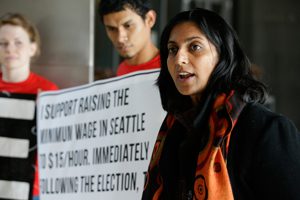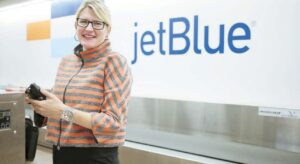
By eTurbo News
King County Superior Court Judge Andrea Darvas ruled that the city of SeaTac does not have the authority to set workplace rules within Seattle-Tacoma International Airport because the aviation hub is owned by the Port of Seattle, a separate government entity.
The voter-approved law establishing a $15 minimum hourly wage for travel and hospitality workers in a Seattle suburb encompassing the region’s main international airport does not apply to workers at the airport, a judge ruled on Friday, Dec. 27.
Supporters of the law, who view it as an example for communities elsewhere to emulate in their fight for a living wage, said they will appeal the decision directly to the Washington state Supreme Court.
“The Washington State Legislature has clearly and unequivocally stated its intent that municipalities other than the Port of Seattle may not exercise any jurisdiction or control over SeaTac Airport operations, or the laws and rules governing those operations,” Andrea writes in her ruling.
Andrea is the same judge who in August ruled that the voter initiative be struck from the ballot in a decision subsequently overturned on appeal.
Under her ruling on Friday, the minimum wage and paid sick leave law does not apply to roughly 4,700 airport workers but does cover about 1,600 workers at SeaTac hotels, rental car agencies and parking lots. The law, which as written exempts small firms, unionized workforces and airlines, is set to take effect on January 1.
Supporters of the law, which passed by a margin of 77 votes in November with about 6,000 ballots cast and survived a subsequent recount, say they expected the judge to rule against them but are confident of prevailing on appeal.
“Full-time workers at the airport should be able to support their families without public assistance,” says Heather Weiner, spokeswoman for the union-backed Yes for SeaTac campaign.
Plaintiffs in the case were led by Alaska Airlines, which has its primary hub at the airport and which in 2005 terminated its roughly 500 unionized ramp workers there, some of whom were rehired as lower-paid nonunion contractors.
“Alaska Airlines believes in fair pay and benefits for all workers, and we respect every worker and the job they do,” says Alaska Airlines spokesman Paul McElroy. “This lawsuit isn’t about $15 an hour. It’s about an initiative that violates state and federal law.”
Washington State’s hourly minimum wage is already higher than any other state’s, and is set to rise by 13 cents to $9.32 an hour in January. The new wage in the city of SeaTac will be among the nation’s highest, just below a $15.38 rate mandated for city workers and contractors in Sonoma, California.
The law is not without precedent.
Since 1994, when Baltimore instituted the country’s first so-called living wage ordinance, more than 120 local governments have followed suit, according to the National Employment Law Project.
Four major California airports operate under ordinances similar to the SeaTac law, including one guaranteeing workers at San Jose airport $13.82 an hour plus health insurance, and another mandating that Los Angeles airport workers earn $10.91 per hour plus health benefits.







